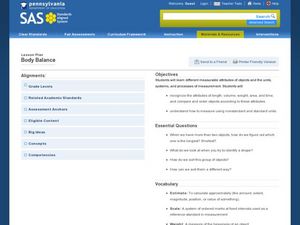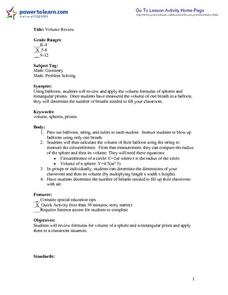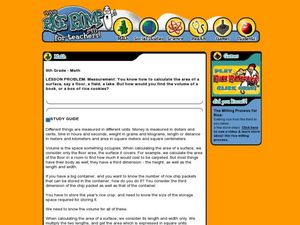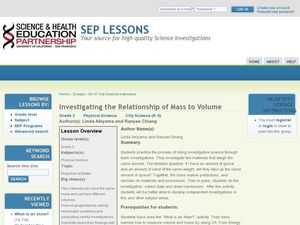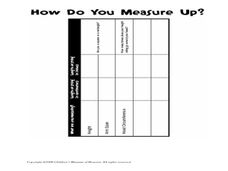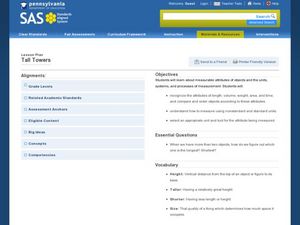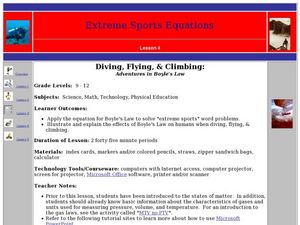Curated OER
Mass, Volume, and Weight
Students explore mass, volume, and weight. In this science and measurement lesson, students compare volume, mass, and weight after listening to the teacher's description of each. Students explore different scales and balances and...
Curated OER
Spoonfuls, Cupfuls and Handfuls
Explore the use of non-standard units for measuring volume with elementary learners. They fill a container and count the number used using cups, spoons, and bottles, build with blocks and count the number of blocks used, and compare and...
Curated OER
Measurement Man: Measuring Volume and Capacity
In this measurement worksheet, students make a measurement man to aid their understanding of the relationships between gallons, quarts, pints, and cups. They make the body of the man using one sheet of paper that represents one gallon...
Curated OER
Body Balance
Examine measurable characteristics of objects to build an understanding of the different ways you can discuss an object's size when comparing it to other objects. After whole group instruction, the class compares and organizes several...
Curated OER
Volume Review
Students investigate the concepts of volume for rectangular prisms and spheres. They measure the volume of one balloon and then consider how many breaths it would take to fill the room with balloons. The rectangular prism being measured...
Curated OER
Measurement: Volume
Sixth graders determine how to find the volume of a box. In this volume lesson, 6th graders participate in a lesson in which the teacher uses the associated study guide to explain how to find the volume of a cubic figure. They use boxes...
Curated OER
Bellwork for Week 2-Experimental Design and Measurements
In this experimental design and measurement worksheet, students answer questions about independent and dependent variables, they write hypotheses, they identify instruments that measure mass, weight, and volume and they calculate the...
Curated OER
Units of Measure
In this identifying units of measure worksheet, students estimate the volume of their bodies using the bath method and component method, estimate the density of their bodies and use a conversion sheet to convert metric measurements....
Curated OER
Taking Measurements at Home
In this measurements worksheet, students find their weight, height, width and depth of their bodies at home using equipment around their homes. They use the proper number of significant figures to record their answers and they find the...
Curated OER
Investigating the Relationship of Mass to Volume
Third graders explore the relationship of mass to volume. In this physical science lesson, 3rd graders participate in an investigation with a several materials and measure the mass and volume using scientific tools. Students discuss and...
Curated OER
Density of the Human Body
In this density of the human body activity, students measure several parts of the body to calculate the body volume. Students convert the body volume to body mass and body density.
Curated OER
How Do You Measure Up?
Students measure their body. In this measurement lesson, students use a string to measure their height and the circumference of their head. They record this information on the worksheet provided and answer questions as a group.
Curated OER
Metric Conversions
Students measure an assortment of items using metric measurements. In this measurement lesson, students measure using length, mass, and volume units of measurement. They convert between units. Students learn a mnemonic to assist in...
Curated OER
Tall Towers
Linear measurement is the focus of this math lesson. Youngsters work in groups to build towers with blocks. They build towers represented on index cards and determine how many blocks taller one tower is.
Curated OER
Measure Me!
Third graders use nonstandard concrete methods to estimate and record measurements of their body.
Curated OER
Measure Mania
Groups of students rotate through five classroom stations to estimate, measure, and record volume, length, weight, mass, and area using both customary and metric measure. They evaluate their data to determine how close their estimates...
Curated OER
English Measurement System
Young scholars determine how to convert measurement. In this English Measurement lesson, students discover interesting facts about the history of measurement. Young scholars study formulas and practice using them.
Purdue University
Design of an Earthen Dam for a Lafayette Neighborhood
How do dams support bodies of water? Scholars engage in a hands-on STEM activity where they design, build, and test dams to learn about bodies of water and how humans use natural resources. They learn how criteria and constraints affect...
Curated OER
Unit of Measurement
In this unit of measurement worksheet, students identify the symbols for the metric units of measurement. They write the appropriate unit of measurement for eight statements and they solve three density problems.
Curated OER
Estimating Concrete Volume
Pupils identify rectangular volume calculations, and calculate using formula, concrete table, and calculator.
Curated OER
Galileo's Thermometer: Measuring the Density of Various Unknown Liquids
Sprouting scientists explore the concept of density by making mass and volume measurements for five different liquids. From these measurements, they calculate densities. They apply their learning to explain Galileo's thermometer works...
Cornell University
Buoyancy
Swimmers know to float by turning their bodies horizontally rather than vertically, but why does that make a difference? In an interesting lesson, scholars explore buoyancy and the properties of air and water. They test cups to see which...
Curated OER
Cross Sections and Collision Times
High schoolers solve five problems including finding the cross sectional area of two bodies, determining the swept out volume of a moving body, finding the average particle volume of a body and determining the collision time for a body.
Curated OER
Diving, Flying, & Climbing
Students explore Boyle's Law. In this Boyle's Law lesson, students complete problems involving Boyle's Law. They examine the effects of Boyle's Law upon the human body. Students use the Internet to complete a lab activity.





